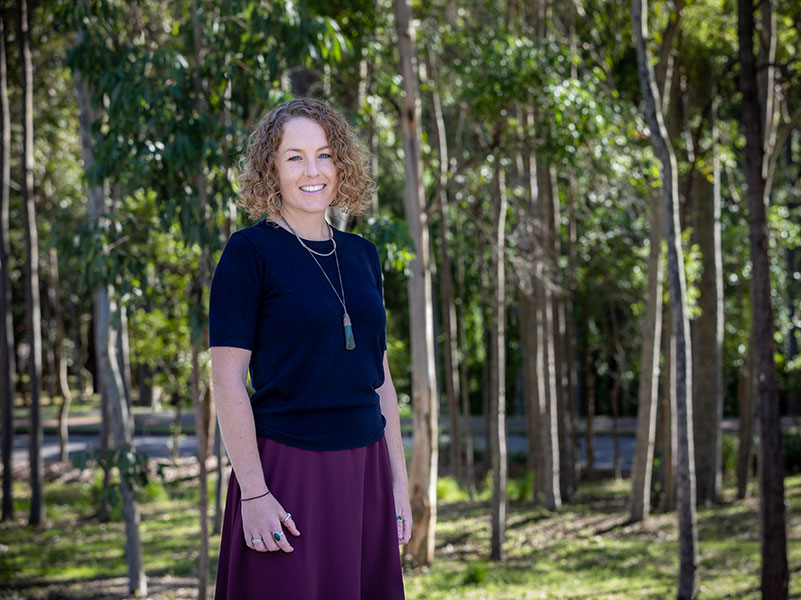Researcher Highlights
Every child’s learning style is unique
Laura Roche
Dr Laura Roche is committed to developing personalised, evidence-based interventions to help young people with neurodevelopmental disorders learn, communicate and flourish within society.

Dr Laura Roche advocates a strengths-based approach to learning for children and youth with neurodevelopmental disorders. Her work is focused on improving the way young people with disorders such as autism communicate with others and navigate their world, starting with acknowledging their existing abilities, understanding their needs, and working in close collaboration with their families to implement evidence-based interventions.
“Children with neurodevelopmental disorders often miss out on developing meaningful social relationships, expressing themselves, or even asking for something they want,” explains Laura.
“This can be stressful for families and can result in the child developing problem behaviours to have their needs met, causing even greater stress, and reducing the whole family’s quality of life.
“My research seeks to empower these children by providing them with alternative ways to achieve basic adaptive behaviour skills, subsequently increasing their quality of life, reducing their reliance upon maladaptive behaviours, and creating opportunities for them to become active members of their communities.”
Strong beginnings and global partnerships
With a background in neuroscience, Laura’s research trajectory was kick-started by her fascination with how the human brain works, and what happens when it doesn’t work quite like it should.
“Neurodevelopment is such a complex and precise process. Everything needs to happen at exactly the right time. When I first ventured into research, I wanted to understand how we learn to communicate and why communication is so important.”
After completing further studies in neuroscience and psychology, Laura took up a post as a research assistant with Professor Jeff Sigafoos from the Victoria University of Wellington, New Zealand, a pioneer in the field of communication intervention for children with autism. They have maintained a strong research partnership ever since, which has resulted in the continuation of publications within international high-impact scientific journals and plans for many more research papers to come.
“Prof Sigafoos helped to shape my understanding of early communicative behaviours, enabled me to work with a diverse range of children with complex communication needs and developmental disabilities, and gave me the opportunity to progress in my early career.”
Today, Laura’s research findings are contributing to a growing evidence-base on how to support children with learning difficulties, and highlight the benefits of working with children individually, as well as with their family, to tailor interventions that can then be replicated at home or elsewhere.
“Every child is different, and every child requires a different approach to learning. I show parents how to successfully implement effective procedures at home, creating a family-centred approach to intervention, empowering the parents to continue enhancing their child’s skills.
“I feel a sense of pride when a child exceeds the expectations placed on them. Whether this be from the parents, family members, or the child’s teachers.”
Researching rare neurodevelopmental disorders
After moving to Australia, Laura spent time working at the University of Queensland’s Centre for Children’s Health Research, where she gained invaluable insight into the lived experiences of families who have a young child with a rare neurodevelopmental disorder. Although this cohort often require specialised communication intervention—as their diagnoses result in complex learning and health issues—they can all too frequently miss out on receiving much-needed learning support.
“Some children are ‘written off’ from instructional tasks as some consider these children to be difficult to teach due to their complex disabilities. It can be hard to find effective ways to teach them meaningful skills.”
This firsthand knowledge of families’ challenges set Laura in good stead for her current role within the University of Newcastle School of Education and Arts’ Special Education Team. In collaboration with other talented researchers, Laura began to investigate new methods to enhance the communication skills of children with rare neurodevelopmental disorders living in the local Hunter region.
“My research includes supporting children with complex communication needs by identifying effective teaching strategies that can help create opportunities for these children to experience real success. It is very challenging, however, there is evidence that intervention approaches used in different populations may be useful for these children, and I’m excited to research this further.
For children of every ability, Laura is quick to point out that interventions must be individually tailored. Every child is different, and no one intervention should ever be applied generally or expected to be a quick fix.
“I am really interested in why something doesn’t work for some children, and the best ways we can quickly adapt our instruction or teaching methods to suit every individual learner.”
Supporting university students with autism
Along with investigating rare neurodevelopmental disorders, Laura has recently launched a new study aimed at better understanding the impact of autism on university students’ sleep and anxiety. The study will survey students on the autism spectrum disorder to determine how society can better support them both during their studies and after graduation.
“Research in Australia indicates that adults on the autism spectrum are not receiving enough support once they leave high school.
“Therefore, identifying how their sleep and mental health impacts upon their university experiences may inform specific support strategies, and could greatly impact upon these students’ quality of life.”
Across all her work, Laura shows steadfast dedication to education and research excellence. Her work is helping to develop better support strategies for young people, helping to provide our next generation—and their families—with practical solutions, encouragement and hope.
“Our society is only as strong as our most vulnerable members. We must support and enhance the quality of life of our children with the most severe and complex disabilities to become a stronger society. Every child has the right to learn and experience success.”
The University of Newcastle acknowledges the traditional custodians of the lands within our footprint areas: Awabakal, Darkinjung, Biripai, Worimi, Wonnarua, and Eora Nations. We also pay respect to the wisdom of our Elders past and present.